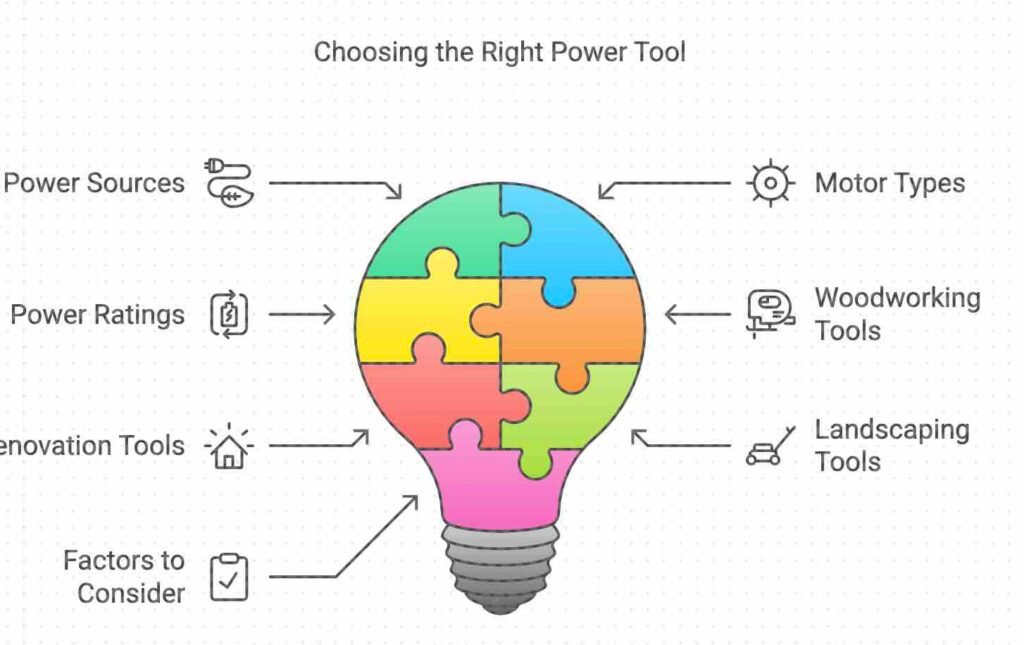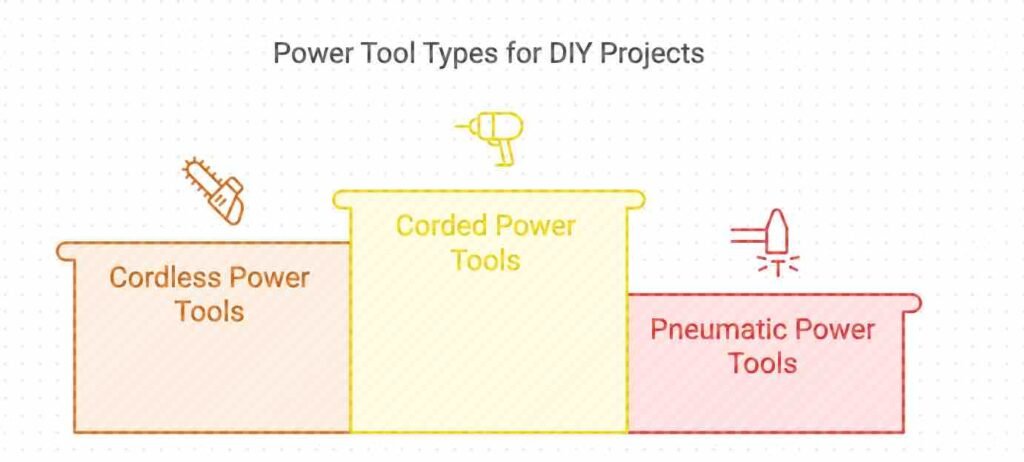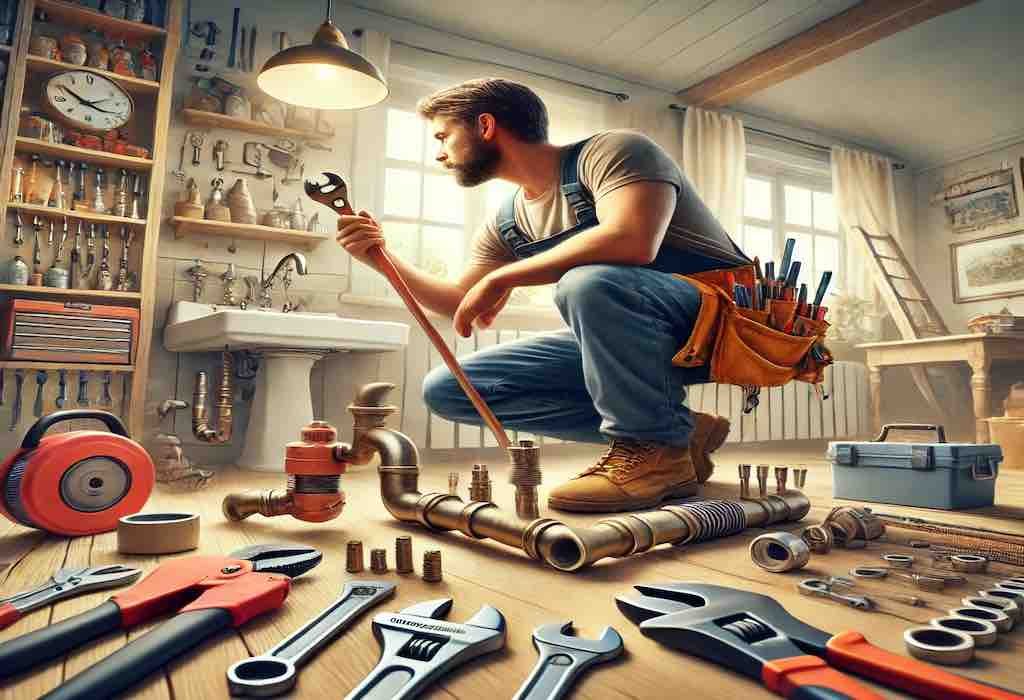Choose the Right Power Tool for Your Project?
In DIY and home improvement, having the right power tool can make all the difference between a frustrating experience and a satisfying, efficient project. But with the vast array of power tools available, how do you know which one is right for your specific needs? This comprehensive guide will walk you through selecting the perfect power tool for your project, ensuring you make an informed decision that will serve you well for years to come.
Understanding Power Tool Basics
Before diving into specific tool selections, it’s essential to understand some basic concepts about power tools:

Power Source
Power tools generally come in three varieties:
- Corded: These tools offer consistent power and are great for heavy-duty, prolonged use. However, they’re limited by cord length and require an electrical outlet.
- Cordless: Battery-powered tools offer excellent portability and convenience. They’re ideal for jobs where power outlets are scarce or for quick tasks around the home.
- Pneumatic: These tools use compressed air and are typically found in professional settings due to their power and efficiency. However, they require an air compressor to operate.
Motor Types
Power tools use different types of motors:
- Brushed Motors: These are common in less expensive tools. They’re reliable but may require more maintenance over time.
- Brushless Motors: These are more efficient, produce less heat, and generally last longer. They’re often found in higher-end tools.
Power Ratings

Power tools are rated based on their power output:
- For corded tools, look at the amperage (A) rating.
- For cordless tools, consider the voltage (V) of the battery.
- For both, check the watts (W) if available, as this gives a true measure of power output.
Higher ratings generally mean more power, but also consider the tool’s intended use and your specific needs.
Matching Tools to Projects
Now that we’ve covered the basics, let’s look at how to match specific power tools to common project types:
Woodworking Projects
- Drill/Driver: Essential for drilling holes and driving screws. Look for a cordless model with at least 18V for versatility.
- Circular Saw: This tool is great for making straight cuts in wood. A 7 1/4-inch blade is standard for most home projects.
- Jigsaw: Ideal for cutting curves and intricate shapes in wood. Look for models with variable speed control.
- Router: This tool is perfect for creating decorative edges and joints. Consider a model with both plunge and fixed bases for versatility.
- Sander: Essential for smooth finishes. An orbital sander is versatile for most projects.
Home Renovation Projects

- Reciprocating Saw: Excellent for demolition work. Look for models with variable speed and orbital action.
- Impact Driver: Great for driving long screws and lag bolts. These deliver more torque than standard drill/drivers.
- Angle Grinder: Useful for cutting metal, removing rust, and grinding. A 4 1/2-inch model is versatile for most home uses.
- Oscillating Multi-Tool: Incredibly versatile for cutting, sanding, and scraping in tight spaces.
Landscaping and Outdoor Projects
- String Trimmer: For edging lawns and cutting weeds. Consider a cordless model for maximum portability.
- Chainsaw: For cutting trees and large branches. Electric models are good for occasional use, while gas-powered saws are better for frequent, heavy-duty work.
- Leaf Blower: For clearing leaves and debris. Again, cordless models offer great convenience for most home users.
Factors to Consider When Choosing Power Tools
When selecting a power tool for your project, consider the following factors:
1. Frequency of Use
If you’ll use the tool frequently, invest in a higher-quality model. For occasional use, a less expensive option might suffice.
2. Power Requirements
Consider the most challenging job the tool will need to handle. It’s better to have slightly more power than you need rather than not enough.
3. Ergonomics and Weight
Hold the tool before buying, if possible. It should feel comfortable and not too heavy, especially if you’ll be using it for extended periods.
4. Brand Reputation and Warranty
Stick to reputable brands known for quality. Check the warranty terms – longer warranties often indicate higher quality tools.
5. Compatibility
If you own cordless tools, consider using the same brand for battery compatibility.
6. Safety Features
Look for tools with safety features like blade guards, safety switches, and anti-kickback mechanisms.
7. Additional Features
Consider features like LED work lights, dust collection systems, or variable speed controls that might make your work easier.
Tips for Buying Power Tools
- Read Reviews: Look for reviews from professionals and DIY users to get a well-rounded perspective.
- Compare Prices: Check prices across multiple retailers, but be wary of deals that seem too good to be true.
- Consider Kits: Tool kits can offer better value if you need multiple tools from the same brand.
- Try Before You Buy: Test the tool in the store or borrow a similar model from a friend.
- Future-Proof Your Purchase: Consider whether the tool will meet your needs not just now but in the future as your skills improve.
Maintaining Your Power Tools
Once you’ve selected the correct power tool, proper maintenance is key to ensuring its longevity and performance:
- Clean After Use: Remove dust and debris after each use.
- Regular Inspection: Check for wear and tear, loose parts, or damage before each use.
- Proper Storage: Store tools in a dry place to prevent rust and corrosion.
- Follow Manufacturer Instructions: Adhere to specific maintenance guidelines provided by the manufacturer.
- Sharpen and Replace Parts: Keep cutting tools sharp and replace worn parts as needed.
Related
How to Choose the Right Power Drill for Your Home Projects: A Comprehensive Guide
The Ultimate Guide to Home Maintenance: Seasonal Checklist
Top 10 Essential Tools Every DIY Enthusiast Needs
Step-by-Step Guide to Selecting the Right Power Tool
Frequently Asked Questions
- Q: Is it better to buy corded or cordless power tools?
A: It depends on your needs. Cordless tools offer portability and convenience, making them great for most home DIY projects. However, corded tools provide consistent power and are often less expensive. Corded tools might be preferable for heavy-duty or prolonged use.
- Q: How important is the brand when choosing power tools?
A: Brand can be quite important, as reputable brands often offer better quality, reliability, and customer support. However, some lesser-known brands also produce excellent tools. Research and read reviews to make an informed decision.
- Q: Can I use the same battery for different cordless tools?
A: If the tools are from the same brand and product line, you can often use the same battery across multiple tools. One advantage of sticking with a single brand for cordless tools is this.
- Q: How do I know if a power tool has enough power for my project?
A: Check the power ratings (amperage for corded tools, voltage for cordless) and compare them to the recommendations for your specific task. When in doubt, opt for slightly more power than you think you’ll need.
- Q: Are more expensive power tools always better?
A: Not necessarily. While higher price often correlates with better quality and more features, there are excellent mid-range tools that offer great value. Consider your specific needs and budget when making a decision.
Conclusion
Choosing the right power tool for your project can be manageable. By understanding the basics of power tools, considering your project needs, and factoring in aspects like frequency of use and ergonomics, you can make an informed decision that will serve you well.
Remember, the best power tool is one that meets the requirements of your current project and will also serve you well in future endeavors. Investing in quality tools, when possible, can save you money and frustration in the long run. Ready to find the perfect power tool for your next project? Visit Handtoolz.com for a wide selection of high-quality power tools from trusted brands. Our knowledgeable staff is always ready to help you make the best choice for your needs. For personalized advice or questions about our products, don’t hesitate to contact us at support@handtoolz.com. Happy tool hunting, and here’s to your next successful DIY project!

